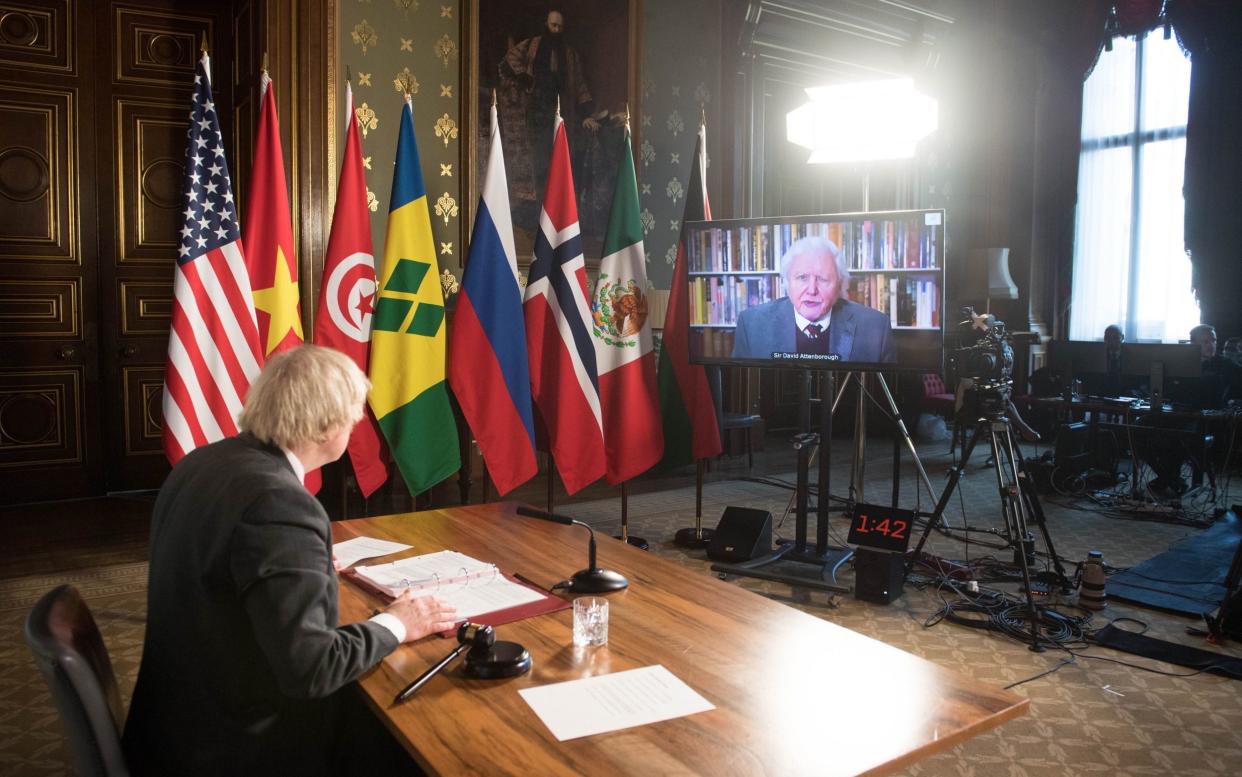Climate change could cause repeat of First World War conflict, Sir David Attenborough warns

- Oops!Something went wrong.Please try again later.
Climate change threatens to cause a disaster as bad as the First World War as people fight for resources, Sir David Attenborough has warned the UN Security Council.
In a session chaired by Boris Johnson, the first time a British Prime Minister has taken on the role in almost 30 years, the naturalist told world leaders that declining ocean health, access to food and water and the destruction of people's homes could lead to global conflict.
The 94-year-old warned the heads of state that they were tasked with "preventing a repetition of that terrible catastrophe, the Great War, that took place during my youth and transformed the whole generation."
Sir David's address opened the online session, which covered the threats climate change poses to national security around the world.
"If we continue on our current path we will face the collapse of all that gives us our security - food production, access to fresh water, habitable ambient temperature and ocean food chains.
"If the natural world can no longer support the most basic of our needs, then much of the rest of civilisation will quickly break down. Please make no mistake - climate change is the biggest threat to security that modern humans have ever faced," he said.
Last year Australia-based think tank The Institute for Economics and Peace warned that over a billion people could be displaced by 2050 as a result of problems caused by climate change.
Rising sea levels, water scarcity, desertification and land degradation are all expected to contribute to people having to move, with an estimated 9.8m people displaced in the first half of 2020 due to natural disasters.
Making his own plea to other members of the council, including US special presidential envoy for climate John Kerry, French president Emmanuel Macron and Norwegian prime minister Erna Solberg, the Prime Minister said it was a matter of "when not if" for climate change to disrupt domestic security.
"There are people around the world who will say that this is all green stuff from a bunch of tree-hugging tofu-munchers, and not suited to national diplomacy and international politics. I couldn't disagree more," Mr Johnson told the session.
"When are we going to do something if we don't act now, when changing sea levels are affecting navigation around our coasts, or when huddled masses fleeing drought or wildfire or conflict over resources arrive at our borders.
"Whether you like it or not, it is a matter of when, not if, your country and your people will have to deal with the security impacts of climate change."
Mr Kerry said inaction on climate change was "almost tantamount to a mutual suicide pact" and called Cop26 "literally our last best hope".
"We have to make certain that cooperation, not conflict, is the response of first resort," he said.
Mr Johnson said young people could be put at risk of being radicalised by extremist organisations in refugee camps or falling prey to human traffickers if they were displaced by the effects of climate change.
The UK is hosting both the G7 meeting of world leaders in Cornwall in June and the global Cop26 climate summit in Glasgow in November, and the Prime Minister has called on world leaders to make ambitious pledges to tackle climate change.
The Government's own ten-point plan for the environment, published last autumn, won plaudits for its ambition, but critics say more tangible action needs to be taken if the UK is to reach its goals for cutting emissions and repairing damage to natural features such as peat bogs and wetlands.
Environment charity Greenpeace described Mr Johnson's call as "weapons-grade hypocrisy".
Senior climate campaigner Ariana Densham said: "The Prime Minister is right to call for global action to avoid the catastrophic impacts of the climate crisis and the disruption to peace and security that it will bring.
"But such demands are almost laughable when you’re planning new coal mines at home and stripping funds for carbon-cutting energy efficiency measures."
add -
It came as Environment Agency chief executive Sir James Bevan warned that UK floods were tracking "reasonable worst case scenario" predictions.
The current course of events could lead to extreme heatwaves, higher sea levels, wildfires and lower crop yields, he told the annual conference of the Association of British Insurers.
"If that sounds like science fiction let me tell you something you need to know. This is that over the last few years the reasonable worst case for several of the flood incidents the EA has responded to has actually happened, and it’s getting larger.
"That is why our thinking needs to change faster than the climate. And why our response needs to match the scale of the challenge," he said.

